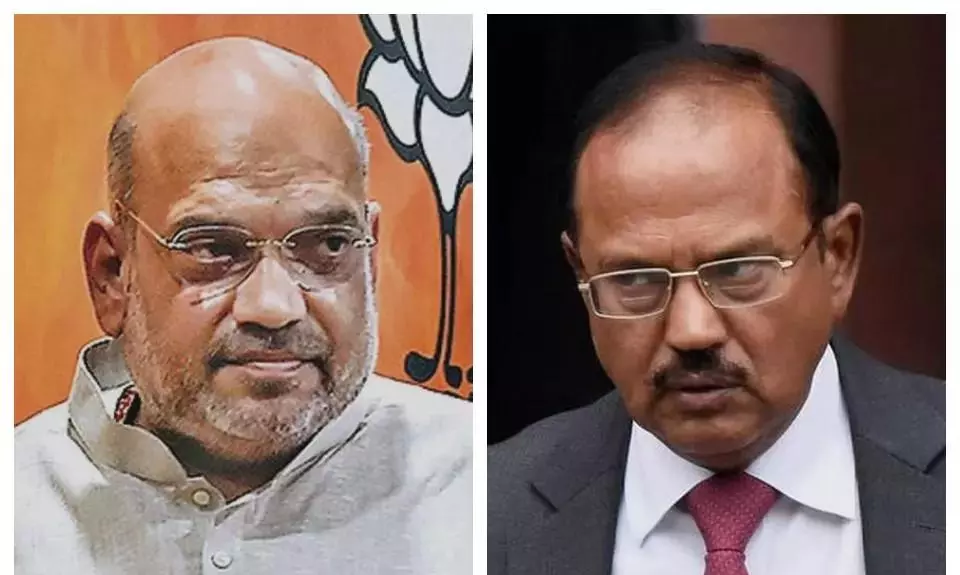
Canadian Minister confirmed Amit Shah’s link to Sikh killing to Washington Post: Report
text_fieldsAs India and Canada are at loggerheads, it is expected to worsen further with the report of Canadian Deputy Foreign Affairs Minister David Morrison confirming to the Washington Post the involvement of India’s Home Minister Amit Shah in the killing of Sikh separatists in Canada.
The disclosure was made during a Canadian parliamentary committee hearing on public safety, where officials elaborated on the alleged involvement of Indian diplomats in criminal activities against Indo-Canadian citizens.
The Washington Post initially reported the involvement of Indian diplomats in intelligence and security operations directed at Sikh separatists in Canada, later updating its report to include Amit Shah’s alleged role, following additional sources.
The revelations have intensified diplomatic rifts between the two countries, following accusations by Canadian Prime Minister Justin Trudeau that Indian government agents were responsible for the killing of pro-Khalistan advocate Hardeep Singh Nijjar, whom India has designated as a terrorist.
India, on October 14, was notified by Canada of six diplomats who were identified as “persons of interest” in an ongoing investigation. In response, India withdrew these diplomats and declared six Canadian officials persona non grata. Canada also issued expulsion orders to six Indian diplomats in Ottawa on the same day, signalling a deepening crisis in bilateral relations.
In a press briefing that day, Canada’s Royal Canadian Mounted Police (RCMP) disclosed that its investigations extended beyond Nijjar’s death, implicating Indian diplomats in an alleged partnership with jailed gangster Lawrence Bishnoi, whose criminal syndicate is suspected of intimidating Canadian nationals of Indian origin.
This briefing followed an earlier, undisclosed meeting on October 12 in Singapore, where Canadian and Indian senior officials, including Indian National Security Advisor Ajit Doval, discussed evidence linking Indian officials to violent acts against Indo-Canadians. At this meeting, Canada’s RCMP deputy commissioner presented a range of evidence reportedly demonstrating connections between Indian diplomats and violent criminal actions orchestrated within Canada. Canadian officials stated that their objective was to counter “disinformation” from India by clarifying the nature of these alleged activities.
According to Canadian national security advisor Nathalie Drouin, the Canadian foreign ministry was first approached by the RCMP in late August with information suggesting that Indian diplomats were gathering intelligence on Canadian nationals using intimidation tactics.
This intelligence, reportedly shared at high levels within the Indian government, was alleged to be a precursor to criminal activities involving Indo-Canadian citizens through networks linked to Bishnoi. The crimes under scrutiny include homicides, assassination plots, and extortion, which Canadian officials argue point to interference in the safety of their citizens.
Despite repeated requests by Canadian authorities, Indian officials allegedly impeded RCMP efforts to meet Indian counterparts by rejecting visa applications at short notice. Further attempts by the RCMP to meet in Washington were also reportedly dismissed by Indian officials.
The October 12 Singapore meeting, initially intended to remain confidential, reportedly included Canadian proposals that would allow India to voluntarily withdraw diplomats or expand an internal investigation committee. Canada also proposed establishing a bilateral framework to reduce foreign interference and requested cooperation in deactivating Bishnoi’s Canadian operations.
Following the meeting, however, Canadian officials claimed that India publicly refuted the need for further accountability, contradicting their confidential agreement. This move prompted Ottawa to proceed with expelling the diplomats, asserting that India’s lack of cooperation compromised the safety of Canadians.
In response, Indian authorities dismissed the accusations, characterizing them as “preposterous” and alleging that Trudeau’s government sought to appeal to Sikh vote banks.























